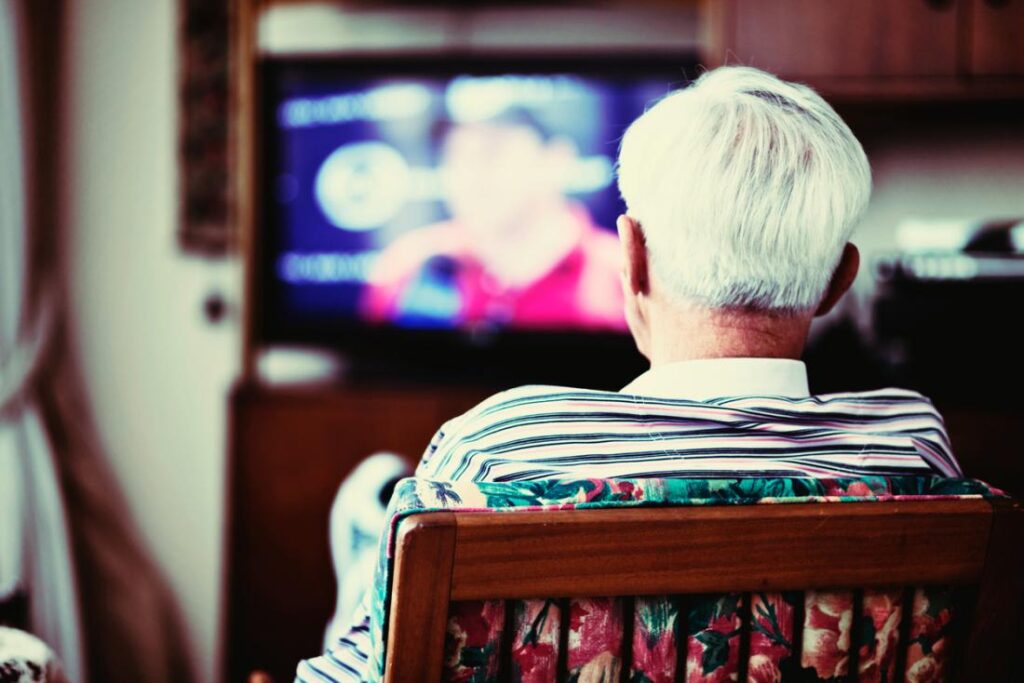As kids, you heard your parents say it time and time again. “Don’t sit so close to the TV, you’ll ruin your eyes!” or “get outside and play… you’re going to turn into a couch potato!”. As much as we hate to admit it, it turns out that Mom and Dad were right, once again. Too much TV can truly “rot” your brain! So now, as our parents get older, and we morph into our caregiver role, it’s time for us to gently remind them that spending too much time in front of the “boob tube” can indeed have negative consequences.
Data shows that senior citizens, ages 65+, spend more than one third of their waking hours watching television. This is approximately three times more than that of younger adults. Research also shows that seniors do not find this time as relaxing or enjoyable as younger people do. Most middle aged and young adults retreat to the couch and get lost in a show to unwind and decompress from the stresses of the day. However, our older peers are using it as a meaningless way to fill the time in their day, with little fulfillment involved.
In order to help promote a healthier lifestyle for our loved ones, it’s important for us to understand the negative effects that too much time in front of the television actually has. Additionally, we need to provide alternate options available at their disposal to make their days more meaningful, productive, and fulfilling.
- The most obvious issue with camping out on the couch for a large portion of your day, is the sedentary or inactive lifestyle that accompanies this. To put it simply, if you’re spending the bulk of your day as a couch potato, sitting down, then you’re missing out on physical activity and movement that your body needs to properly function. Prolonged periods of inactivity lead to a plethora of health issues, including, but not limited to, an increased risk of diabetes, increased blood pressure, high cholesterol, poor circulation, weight gain and muscle loss, and a weakened immune system. As we age, we are already more susceptible to many of these negative health effects, so we should put forth a conscious effort to avoid them, rather than encourage them.
- Too much television not only affects our daytime activity, but it can wreak havoc on our sleep habits, as well. Research shows that overindulging in screen time during the day, or watching television too close to bedtime, can disrupt and alter our sleep routines at night. The brain’s natural production and release of melatonin, a hormone secreted by the pineal gland, is triggered by darkness. Light emitted from the television can prevent or delay the release of melatonin into the bloodstream, resulting in difficulty falling asleep. Additionally, the content we watch on TV can sometimes be unsettling, exciting, or overstimulating, making it difficult to unwind at night. Both of these factors can cause people of all ages to struggle with a solid night’s sleep, because our natural sleep pattern becomes disturbed and interrupted. One tip to help promote healthy sleep is to turn off the screen at least 1 hour before your desired bedtime.
- Staring at the TV screen for too long can cause physical aches and pains too! Our eyes can be affected from the constant strain of looking at the TV. It can cause our vision to deteriorate and can also be the culprit of headaches. Additionally, slothing on the couch for the better part of your day creates poor posture. This, in combination with the muscle loss due to inactivity (as mentioned above), can inadvertently lead to neck and back problems. Our core muscles are heavily responsible for our balance, strength, and flexibility. In turn, a weakened core increases the risk of falls, as well as the need for assisted mobility devices, such as a cane or a walker.
- Not only can you experience negative physical effects from wasting your day away in front of the television, but you can be mentally impacted as well. Studies show an increased risk of depression and anxiety, dementia, and even memory loss amongst avid TV watchers. Though the exact correlation has not been pinpointed, there are many contributing factors that are noted, including reduced energy expenditure, a decrease of social interaction with others, increased caloric intake, reduced cognitive and physical activity, and even the actual content of the television programs. All of these elements are collectively believed to negatively impact your mental health.
Because we all want what is best for our loved ones, limiting their television time is highly advisable. The most effective way to do this is to intentionally set aside time where they are unplugged and engaging in other activities. Some suggestions for both independent and social opportunities include puzzles, knitting, exercise, card games, prayer groups or Bible studies, arts and crafts, reading, and gardening, just to name a few. All of these activities offer alternatives that are both physically and mentally stimulating, as well as entertaining. You can still set aside a specific time where they can relax and enjoy watching a show or movie. The goal is to encourage them to spend the bulk of their awake time partaking in meaningful activities that promote a healthy lifestyle. For more ideas on living a healthy senior lifestyle please visit our website at nolahomecare.com

